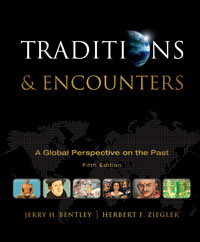1 A) Portuguese adventurers defeated the Chinese navy. B) new Mongol invasions turned China's attention to the north. C) the navy was considered too great a drain on the imperial resources. D) Qing emperors feared that new ideas would lead to political instability. E) All these answers are correct. 2 A) They were nomadic warriors from Manchuria. B) They spoke a different language from that of their ethnic Chinese subjects. C) They rejected Confucian principles in favor of a Mongol-style tribal council. D) They established the Qing dynasty. E) They ruled China from the Forbidden City in Beijing. 3 A) With few exceptions they came from a class of well-educated, highly literate men. B) They were independent warlords, far from court and above the law. C) They were responsible for the security and stability of the country. D) Their appointment was based on their performance in the civil service exams. E) They enjoyed positions of power and prestige. 4 A) It was open to all men regardless of social standing. B) It provided the poor with an avenue for upward social mobility. C) It ensured that the most progressive men available governed China. D) It guaranteed the central place of Confucianism in Chinese education. E) It was very competitive, with only a fraction of those applying gaining a government post. 5 A) an unmarried son. B) the mother of grown sons. C) a young husband. D) dead ancestors. E) a daughter-in-law. 6 A) the practice of foot binding. B) female infanticide. C) the forced burning of widows. D) a wife's obligations to her in-laws. E) arranged marriages. 7 A) silk. B) silver. C) porcelain. D) lacquerware. E) tea. 8 A) unnecessary to China but a favor to England. B) mutually beneficial to both countries. C) dangerous to both countries. D) dangerous to England but beneficial to China. E) None of these answers is correct. 9 A) peasants. B) gentry. C) workers and artisans. D) merchant class. E) "mean people." 10 A) honored for their contributions to society. B) considered social parasites. C) considered "mean people." D) ineligible for civil service positions. E) All these answers are correct. 11 A) widespread literacy and popular fiction. B) an open mind to different religions' traditions. C) conservative values such as filial piety and submission to authority. D) independent thinking and resistance to authority. E) None of these answers is correct. 12 A) Jesuits attracted many converts, and Christianity became a popular religion. B) Jesuits made an effort to learn Chinese and to understand Chinese culture. C) Jesuits captured Chinese interests with European science and technology. D) Other Catholic missionaries criticized the Jesuits' tolerance of Chinese traditions. E) Most Chinese were put off by Christianity's claim of being the only true religion. 13 A) hereditary emperor. B) a temporary military ruler in support of the emperor. C) the elected lord of the daimyo . D) a powerful regional warlord. E) None of these answers is correct. 14 bakufu A) obliged the daimyo to live in the capital on alternative years. B) limited contacts between individual daimyo. C) had final approval over all marriage alliances among the daimyo. D) limited contacts between daimyo and the outside world. E) All these answers are correct. 15 A) forbidding Japanese from going abroad. B) forbidding Chinese and Dutch merchants from trading at Nagasaki. C) forbidding scholars of neo-Confucianism from teaching in Japan. D) banning all foreign religions, such as Confucianism and Buddhism. E) All these answers are correct. 16 A) abortion. B) contraception. C) infanticide. D) late marriage. E) All these answers are correct. 17 A) centers of neo-Confucian learning. B) important Shinto shrines and Buddhist temples. C) Kabuki theaters, brothels, public baths, and teahouses. D) decorated luxury boats floating over the river water. E) All these answers are correct. 18 A) Christians were restricted to a few carefully controlled missions. B) Christians were brutally persecuted and driven into secrecy. C) Christianity merged with Buddhism and Shintoism into a new syncretic religion. D) Japanese Christians continued to worship but lost support after European trade was restricted. E) None of these answers is correct. 19 A) weapons and armaments. B) representational drawing and linear perspective. C) astronomy and calendars. D) anatomy and medicine. E) Dutch language. 20 Deus Destroyed , Fabian Fucan expressed his concerns thatA) Japanese Christians were being persecuted by the shogunate. B) Japanese converts had too easily abandoned Christianity. C) Christian missionaries were misguided as to the true faith. D) Christian missionaries planned to subvert Buddhism and destroy traditional Japanese culture. E) without the Christian mission in Japan, the country would lose all contact with the outside world.





